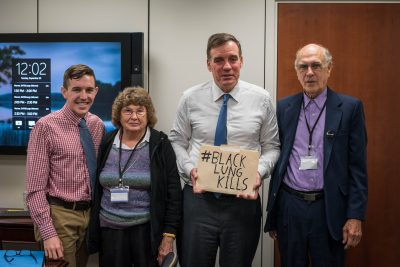Front Porch Blog

Hundreds of coal miners in this part of the state suffer from this incurable, progressive disease — many more throughout the country — which comes from breathing coal dust over long periods of time. And even though coal has been in decline for a number of years, the incidence of black lung disease has grown significantly, and is impacting younger miners than ever before.
The Black Lung Disability Trust Fund provides medical care and financial support for miners with black lung and their dependents, acting as a safety net when employer benefits are not available. Established in 1977, the fund is financed by an excise tax on coal production, but the rate is set to be cut in half at the end of 2018. Unless Congress acts.
One of those who traveled to D.C. was Tyler Hughes, a councilman from Big Stone Gap who hand-delivered resolutions passed by his town, as well as by the towns of Pennington Gap, Haysi and Dungannon, in support of maintaining the excise tax at its current rate to Sen. Mark Warner and Rep. Morgan Griffith.

Big Stone Gap councilman Tyler Hughes, Peggy Brock from the SWVA chapter of the Black Lung Association and Bethel Brock, president of the SWVA chapter of the Black Lung Association and a former miner living with complicated black lung disease, met with Senator Mark Warner (second from right) to hand-deliver four local resolutions of support for extending the black lung excise tax.
“It’s important for Congress to understand that this is more than just a healthcare issue. It’s also an economic issue,” said Councilman Hughes, who was joined by several people associated with The Alliance for Appalachia, a regional coalition. “People who have sacrificed their health for our country depend on these black lung benefits, and residents of our region do not need another economic barrier.”
Earlier this year, a legislative effort to extend the rate was scuttled after industry lobbyists downplayed the studies showing an increase in the disease and claimed the continued rate would harm coal companies.
In August, Sen. Warner introduced a bipartisan bill to improve early detection of black lung disease.
“I’ve been listening to miners and their families about the outbreak of black lung that we’re seeing in Southwest Virginia and across coal country, and it was important to hear also from Councilman Hughes and the advocates from The Alliance for Appalachia,” said Sen. Warner. “This is a public health emergency, and Washington has got to wake up to what’s going on in Appalachia.”
The group also spoke with senators, representatives and congressional staff about the importance of shoring up United Mine Workers of America pensions, as well as passing the RECLAIM Act, a bill which would distribute $1 billion from the existing federal Abandoned Mine Land Fund to states and tribes across the country to reclaim formerly mined lands in ways that spur new economic opportunities.
Currently, no legislation has been introduced to extend the excise tax that finances the Black Lung Disability Trust Fund, but senators and representatives confirmed that the issue is on their radar. And Appalachian Voices and many others will continue keeping this issue front-and-center.
The Alliance for Appalachia is composed of community and regional organizations in Virginia, West Virginia, Kentucky, Tennessee, Alabama and Pennsylvania. Participants from Southwest Virginia included members of the Black Lung Association SWVA Chapter, Southern Appalachian Mountain Stewards, the STAY Project and Appalachian Voices.
Read more about the rise in black lung disease and fight to preserve benefits in the Oct/Nov issue of The Appalachian Voice.
PREVIOUS
NEXT

Leave a comment
Your email address will not be published. Required fields are marked *

Leave a Comment